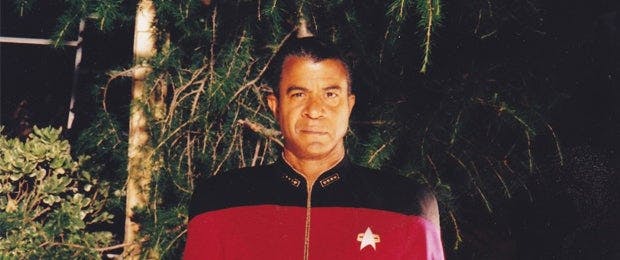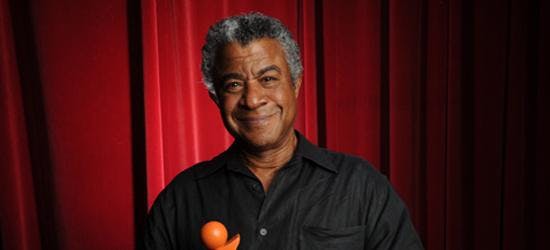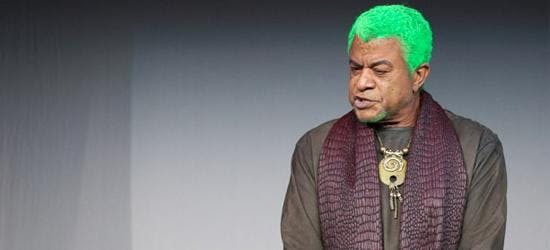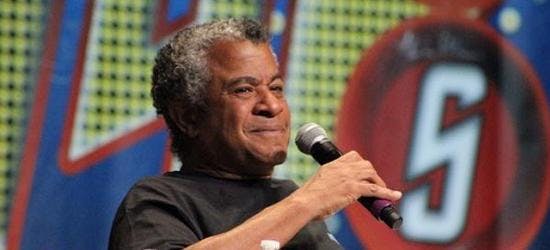Published May 19, 2015
EXCLUSIVE INTERVIEW: VOY & ENT Guest Star Tucker Smallwood
EXCLUSIVE INTERVIEW: VOY & ENT Guest Star Tucker Smallwood

Tucker Smallwood is one of those veteran character actors who has been in more movies and television shows than you ever realized. His credits date back to the 1970s and include Somerset, The Cotton Club, Babylon 5, Bio-Dome, Space: Above and Beyond, Seinfeld, Contact, Frasier, Deep Impact, Strangeland, Malcolm & Eddie, Curb Your Enthusiasm, JAG, The Sarah Silverman Program and Modern Family. He's best known for his role as Commodore Ross on Space: Above and Beyond and for his many visits to the Star Trek universe. Smallwood played Admiral Bullock on Voyager, in the episode "In The Flesh," and the Xindi-Primate Councilor in nine episodes of Enterprise, including "The Xindi," "Proving Ground," "Countdown" and "Zero Hour." These days, he remains an in-demand actor, with several films set for release in 2015. He's also participating in SCI Fest L.A: The Los Angeles Science Fiction One-Act Play Festival, which kicked off on May 7 and will continue until the end of the month. Smallwood stars as Professor Grock in the play Human History, which will run May 21-24. StarTrek.com spoke to Smallwood about all of the above, and here's what he had to say...Let’s start with the present. Tell us about Human History…SMALLWOOD: It’s part of SCI Fest, and we’re marrying a couple of mediums, theater and television. We’re marrying them in the sense that many of the performers appearing in the shows during the fest have acted in many of the franchise sci-fi shows that you’ve seen on television in recent years. Human History is a one-act play. It’s an interesting piece that I think Gene Roddenberry would have appreciated. It examines bias and social status in a way, I think, that communicates its message much more effectively than something that’s right on the button, right on the nose. IMDB lists Forgiveness, Packwood, Another Time, The Lady Killers and Embers as upcoming projects. Are those all accurate? Plus, tell us about Embers, which is a sci-fi film…SMALLWOOD: They are all accurate. Several of them are by emerging talents. I was treated with great generosity and kindness by seasoned professionals when I began in this business, and I feel an obligation to give back. Embers is a delightful piece of work. That was shot on a number of different locales, but I worked in upstate New York. It is a look at a dystopian future world in which a virus has destroyed man’s memory. My character is called The Teacher, and I have lived in isolation for a number of years. I’ve lost the ability to read, which is tragic, because there’s even a book there that I wrote in years past. So it examines how people interact and react under trying circumstances. I meet a feral child who has never learned to speak. He wanders into my reality, and I’m resistant at first because I’m accustomed to being alone. Eventually I take him in and we start to interact, and I’m able to share some human things with him. I’m hopeful we’ll see that film later this year.

Let’s talk Star Trek. Your first Trek appearance was on Voyager. How did that come about?SMALLWOOD: It was my first job in about 6 months. I lost my father on New Year’s Day of 1998. I think went to England for a convention in February. When I came back, I was tested by one of the networks for a new science fiction series, and it was not a good experience. The writer and producer wanted me very much and the director, not so much. He had someone else in mind. So it did not go well. I think within days I woke up one morning, looked at myself in the mirror and thought I’d had a stroke. I was stricken with Bell’s palsy. I didn’t know what it was at the time and I very quickly learned a lot more about it. Only half of my face worked. I told my agents, “You can’t send me out now. If they see me like this, I’ll never work again.” So, for months I didn’t go out. Then I got a call from my agents saying, “Voyager called and would like to see you for this character.” I said, “Well, he’s an alien. I can do that. I sound OK. I only look like hell.” The muscles in my face were very, very slowly starting to respond, but I did not have full control over the muscles. Then I discovered that, yes, he is an alien, but he’s an alien who looks like a human being. He’s disguised in a shape-shifting way as a human being. However, I got the role and when people saw the work they said, “You were so implacable. You were so stern.” I said, “It was the only expression I had.” But it was very affirming. People all over were kind to me throughout this experience. You tend to want to withdraw, especially if you make your life visually, so to speak. I didn’t know if I’d ever work again, and that was the start of my working again.A few years later, there you were on Enterprise as the Xindi-Primate Councilor. Was that an offer? An audition?SMALLWOOD: I had a meeting. Brannon Braga met me outside and said he was very excited about the prospect of working together. I was very flattered. I got the role. Much of the experience was wonderful. Scott Bakula, I’d worked with him on three different projects. He’s just a gem. He set the tone for that show, and it was a very inclusive experience. There was no star system there. Everyone was a peer. And that’s what the concept is in theater, which made sense, since Scott is a theater-trained actor. So it was a wonderful set, a wonderful crew and a wonderful cast. Rick Worthy, Randy Oglesby, Scott MacDonald and I had great fun for months, but it was arduous work in that my makeup took two hours in the morning to put on and an hour and a half in the evening to take off. So if you have a normal work day that’s extended tremendously by the technical elements of a show like Star Trek, and then add another three and a half hours, you can appreciate that it’s a long day’s journey into night. We were there before the sun came up and after the sun went down.


Between the play you’re doing now and all the movies you’ve got coming up, you’re really as busy now as you’ve ever been. How good a feeling is that?SMALLWOOD: I’m very grateful. I’ve been doing this for 44 years, and that’s a long time. I’m as surprised as anyone that I’ve been at it this long, but I’m not surprised to be this busy. I could be busier. I actually turn down probably 70 percent of what comes across my desk. I’ve been doing it so long that I don’t want to walk in the same footprints. I look for fresh snow. It’s one of the other reasons I like the projects from emerging writers and directors, because the characters are often ones I’ve not gotten to do before, in years past. The range of the characters in these emerging-talent projects by and large exceeds what I’m offered in mainstream media. I’ve done many kinds of characters before and I understand why they’ll think of me for mainstream shows and movies, but they’re just not as interesting to me. So I try to find things that allow me to be passionate about them and that engage my attention. The good news is I don’t have to work for money anymore, and I haven’t had to for an awfully long time, so I can do these smaller projects with more challenging acting opportunities. Visit www.scifest.com for more details about and to buy tickets to SCI Fest LA and Smallwood’s play, Human History.

